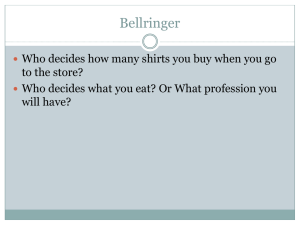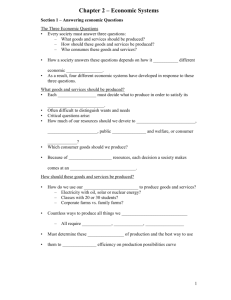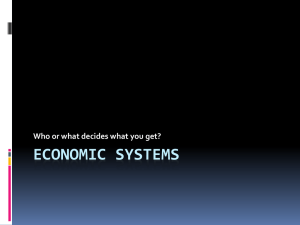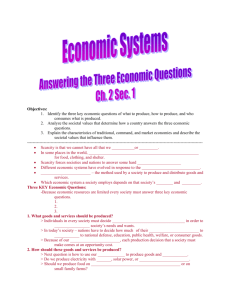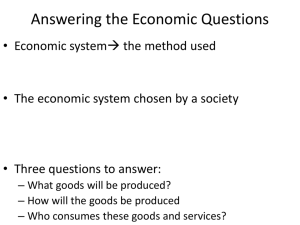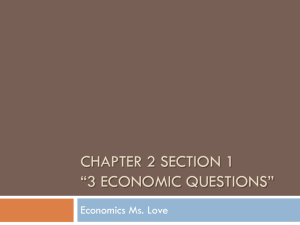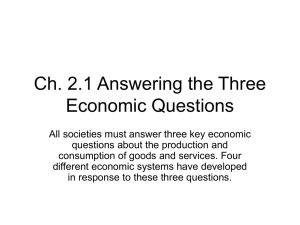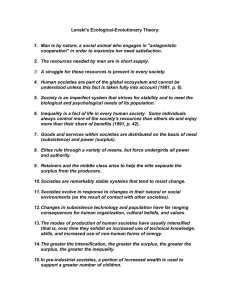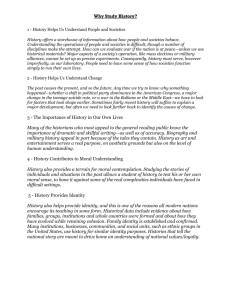CH2Sec1
advertisement
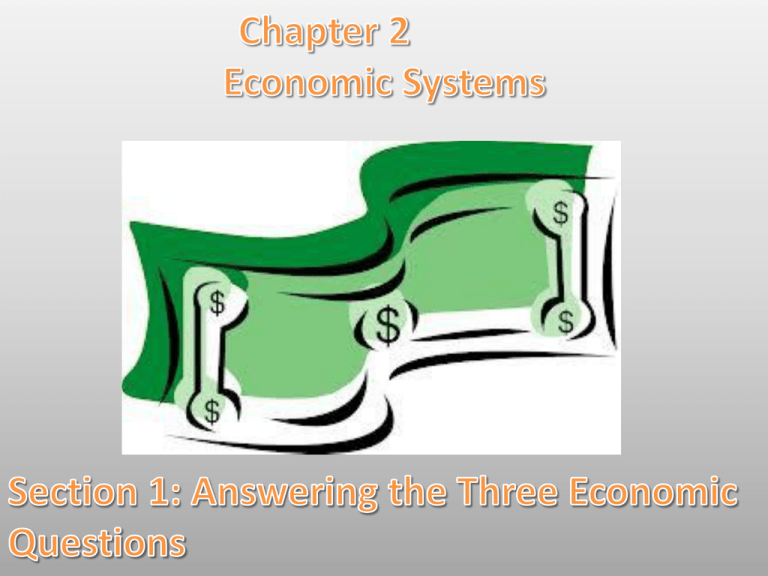
Lesson Objectives: By the end of this lesson you will be able to: *Identify the three key economic questions that all societies must answer. *Analyze the societal values that determine how a country answers the three economic questions. *Define the characteristics of a traditional economy. Principles in Action- Each society faces three questions about the production and consumption of goods and services. AS you’ll see, the questions shape our freedom of choice-and also shape what we have to choose from. Three Key Economic Questions Resources are scarce everywhere. As a result, every society must answer three key economic questions: *What goods and service should be produce? *How should these good and services be produced? *Who consumes these good and services? The way a society answers these three questions defines its economic system. An economic system is the structure of methods and principles a society uses to produce and distribute goods and services. What goods and services should be produced? Each society must decide what to produce in order to satisfy the needs and wants of its people. While all people need food and shelter, societies face additional important considerations. *Which consumer goods should we produce? *How much of our resources should we devote to national defense, education, or consumer goods? Because resources are limited, each decision that a society makes about what to produce come at an opportunity cost. How Should Goods and Services Be Produced? A society must also decide how to produce goods and services. *What fuel should we use to generate electricity-oil, solar power, or nuclear power? *Is education best delivered through public schools or private schools? Although there are many ways to produce goods and services, all require land, labor, and capital. Who Consumes Goods and Services? Societies also make decisions that determine how goods and services are consumed. *How can people meet their needs for food and medical care? *Who gets to drive a new luxury car and who can only afford bus fare? *Who gets access to a college education? The answer to these questions is determined by how societies distribute income. Factor payments are the income people receive in return for supplying factors of production (land, labor, capital). Landowners collect rent, workers earn wages, and those who lend money receive payments called interest. Factor payments also include the profits that entrepreneurs earn if their enterprises succeed. Profit is the amount of money a business receives in excess of its expenses. Economic Goals and Societal Values Different societies answer the three economic questions based on the importance they attach to various economic goals. These goals include: *Efficiency *Freedom *Security *Equity *Growth. All societies pursue each of these goals to some degree. Economic Efficiency Because resources are always scarce, societies try to maximize what they can produce using the resources they have. If a society can accurately assess what its people need and want, it increases its economic efficiency. A manufacturer would be wasting resources producing desktop computers if people prefer laptops. Economic Freedom Most people value the opportunity to make their own choices. In America we have the freedom to buy what we can pay for, to work where we want to work, to own property, and to become entrepreneurs. Still, people all over the world face limitations on their economic freedom. Economic Security Most people do not like uncertainty. We want to know that we can get milk or bread every time we go to the grocery store. We want the security of knowing that we will get our paychecks every payday. Ideally, economic systems seek to reassure people that goods and services will be available when needed and that they can count on receiving expected payments on time. Economic Equality Equity (fairness) is defined differently in different society. Each society must decide how to divide its economic pie. *Should everyone get the same share of the goods and services a nation produces? *Should one’s consumption depend on how much one produces? *How much should society provide for those unable/unwilling to produce? Economic Growth A nation’s economy must grow with its population so it can provide jobs for the new people joining the workforce When the economy grows and people have more income, that nation improves its standard of living, or level of economic prosperity. Innovation plays a huge role in economic growth. Innovation is the process of bringing new methods, products, or ideas into use. Innovations in computers and networking technology are changing how people work, do business, find information, and communicate. Goals in Conflict A society may value other goals than these (Efficiency, freedom, security, equity, & growth). Environmental protection, full employment , or protecting national industries may be among a nation’s chief economic goals. Sometimes, economic goals conflict with one another. For example, when a society provides a safety net for all citizens, the added cost may slow economic growth. To protect the environment, a government may impose regulations on manufacturers. This might curb economic freedom. Thus, all nations must prioritize their economic goals, or arrange them in order of importance. Each choice comes with some kind of trade-off. Traditional Economies The oldest & simplest of economic systems is the traditional economy. A traditional economy relies on habit, custom, or ritual to answer the three key economic questions. There is little room for innovation or change. The traditional economic system revolves around the family unit (including several generations of extended family). Work tends to be divided along gender lines. Boys tend to take up the occupations of their fathers, while girls follow those of their mothers. Traditional economies are usually found in communities that tend to stay small and close. Often people in these societies work to support the entire community, rather than just themselves or their immediate families. In these societies, agricultural and hunting practices usually lie at the center of people’s lives, laws, and religious beliefs. Societies with traditional economies are economically successful if they meet their own needs. But they have few mechanisms to deal effectively with the effects of environmental disaster, such as a flood or drought. They also tend to be slow to adopt new ideas or technology. They may not have access to a wide range of goods. In most cases, these communities lack modern conveniences and have a relatively low standard of living.
